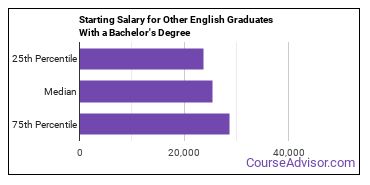Other English Literature
Featured schools near , edit
Types of Degrees Other English Literature Majors Are Getting
The following table lists how many English literature (other) graduations there were in 2020-2021 for each degree level.
| Education Level | Number of Grads |
|---|---|
| Bachelor’s Degree | 574 |
| Associate Degree | 163 |
| Master’s Degree | 145 |
| Doctor’s Degree | 19 |
| Undergraduate Certificate | 17 |
| Basic Certificate | 13 |
| Graduate Certificate | 11 |
What Other English Literature Majors Need to Know
O*NET surveyed people in occupations related to other English and asked them what knowledge areas, skills, and abilities were important for their jobs. The responses were rated on a scale of 1 to 5 with 5 being most important.
Knowledge Areas for Other English Majors
According to O*NET survey takers, a major in other English should prepare you for careers in which you will need to be knowledgeable in the following areas:

- English Language - Knowledge of the structure and content of the English language including the meaning and spelling of words, rules of composition, and grammar.
- Education and Training - Knowledge of principles and methods for curriculum and training design, teaching and instruction for individuals and groups, and the measurement of training effects.
- Communications and Media - Knowledge of media production, communication, and dissemination techniques and methods. This includes alternative ways to inform and entertain via written, oral, and visual media.
- Sociology and Anthropology - Knowledge of group behavior and dynamics, societal trends and influences, human migrations, ethnicity, cultures and their history and origins.
- History and Archeology - Knowledge of historical events and their causes, indicators, and effects on civilizations and cultures.
Skills for Other English Majors
The following list of skills has been highlighted as some of the most essential for careers related to other English:

- Reading Comprehension - Understanding written sentences and paragraphs in work related documents.
- Instructing - Teaching others how to do something.
- Writing - Communicating effectively in writing as appropriate for the needs of the audience.
- Speaking - Talking to others to convey information effectively.
- Active Listening - Giving full attention to what other people are saying, taking time to understand the points being made, asking questions as appropriate, and not interrupting at inappropriate times.
Abilities for Other English Majors
As a other English major, you will find yourself needing the following abilities:

- Written Comprehension - The ability to read and understand information and ideas presented in writing.
- Oral Expression - The ability to communicate information and ideas in speaking so others will understand.
- Oral Comprehension - The ability to listen to and understand information and ideas presented through spoken words and sentences.
- Written Expression - The ability to communicate information and ideas in writing so others will understand.
- Speech Clarity - The ability to speak clearly so others can understand you.
What Can You Do With a Other English Literature Major?
Below is a list of occupations associated with other English:
| Job Title | Job Growth Rate | Median Salary |
|---|---|---|
| English Language and Literature Professors | 9.8% | $66,590 |
Who Is Getting a Bachelor’s Degree in Other English Literature?
Racial-Ethnic Diversity
At the countrywide level, the racial-ethnic distribution of other English majors is as follows:

| Race/Ethnicity | Number of Grads |
|---|---|
| Asian | 32 |
| Black or African American | 23 |
| Hispanic or Latino | 70 |
| White | 382 |
| International Students | 14 |
| Other Races/Ethnicities | 53 |
Geographic Diversity
Students from other countries are interested in Other English, too. About 2.4% of those with this major are international students. The most popular countries for students from outside the country are:
- China
- Saudi Arabia
- South Korea
- Brazil
- Colombia
How Much Do Other English Literature Majors Make?
Bachelor’s Degree Starting Salary
According to 2019-2020 data from the U.S. Department of Education, students who graduated with a bachelor’s degree in other English have a median salary of $25,514 during the early years of their career. During this timeframe, most salaries fell between $23,685 (25th percentile) and $28,668 (75th percentile).

It’s important to note that just because the people reporting these salaries have a degree in other English, it does not mean that they are working in a job related to their degree.
Salaries According to BLS
Other English majors often go into careers with median salaries of $78,150. This median refers to all degree levels, so you may expect those with a more advanced degree to make more while those with less advanced degrees will typically make less.
To put that into context, according to BLS data from the first quarter of 2020, the typical high school graduate makes between $30,000 and $57,900 a year (25th through 75th percentile). The average person with a bachelor’s degree (any field) makes between $45,600 and $99,000. Advanced degree holders make the most with salaries between $55,600 and $125,400.
Amount of Education Required for Careers Related to Other English Literature
Some degrees associated with other English may require an advanced degree, while others may not even require a bachelor’s in the field. In general, the more advanced your degree the more career options will open up to you. However, there is significant time and money that needs to be invested into your education so weigh the pros and cons.
How much schooling do you really need to compete in today’s job market? People currently working in careers related to other English have obtained the following education levels.

| Education Level | Percentage of Workers |
|---|---|
| Less than a High School Diploma | 10.0% |
| Master’s Degree | 31.5% |
| Post-Master’s Certificate - awarded for completion of an organized program of study; designed for people who have completed a Master’s degree but do not meet the requirements of academic degrees at the doctoral level. | 1.3% |
| Doctoral Degree | 60.5% |
| Post-Doctoral Training | 0.3% |
Online Other English Literature Programs
In the 2020-2021 academic year, 91 schools offered some type of English literature (other) program. The following table lists the number of programs by degree level, along with how many schools offered online courses in the field.
| Degree Level | Colleges Offering Programs | Colleges Offering Online Classes |
|---|---|---|
| Certificate (Less Than 1 Year) | 0 | 0 |
| Certificate (1-2 years) | 4 | 0 |
| Certificate (2-4 Years) | 0 | 0 |
| Associate’s Degree | 10 | 1 |
| Bachelor’s Degree | 5 | 2 |
| Post-Baccalaureate | 0 | 0 |
| Master’s Degree | 18 | 0 |
| Post-Master’s | 3 | 0 |
| Doctor’s Degree (Research) | 8 | 0 |
| Doctor’s Degree (Professional Practice) | 0 | 0 |
| Doctor’s Degree (Other) | 0 | 0 |
Is a Degree in Other English Literature Worth It?
The median salary for a other English grad is $78,150 per year. This is based on the weighted average of the most common careers associated with the major.
This is 96% more than the average salary for an individual holding a high school degree. This adds up to a gain of about $765,000 after 20 years!

Top Ranking Lists for Other English Literature
Explore Major by State
Alabama
California
District of Columbia
Idaho
Kansas
Maryland
Mississippi
Nevada
New York
Oklahoma
South Carolina
Utah
West Virginia
Alaska
Colorado
Florida
Illinois
Kentucky
Massachusetts
Missouri
New Hampshire
North Carolina
Oregon
South Dakota
Vermont
Wisconsin
Majors Related to Other English Literature
You may also be interested in one of the following majors related to other English.
| Major | Number of Grads |
|---|---|
| General English Literature | 40,481 |
| Writing Studies | 12,529 |
| Literature | 683 |
References
*The racial-ethnic minorities count is calculated by taking the total number of students and subtracting white students, international students, and students whose race/ethnicity was unknown. This number is then divided by the total number of students at the school to obtain the racial-ethnic minorities percentage.
- College Factual
- College Scorecard
- National Center for Education Statistics
- O*NET Online
- U.S. Bureau of Labor Statistics
- Usual Weekly Earnings of Wage and Salary Workers First Quarter 2020
- Image Credit: By Mike Hazard under License
More about our data sources and methodologies.
Featured Schools
 Request Info
Request Info
|
Southern New Hampshire University You have goals. Southern New Hampshire University can help you get there. Whether you need a bachelor's degree to get into a career or want a master's degree to move up in your current career, SNHU has an online program for you. Find your degree from over 200 online programs. Learn More > |

